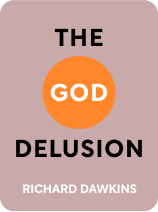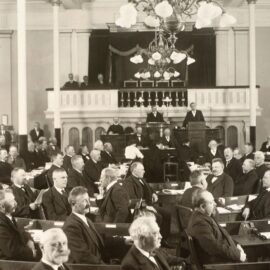

This article is an excerpt from the Shortform book guide to "The God Delusion" by Richard Dawkins. Shortform has the world's best summaries and analyses of books you should be reading.
Like this article? Sign up for a free trial here .
What is the role of religion in society? Why do we hold onto religion in modern times?
The role of religion in society has changed over time, but it has had a lot of influence. In The God Delusion, Richard Dawkins argues that the time for religion in society has passed and humans would be happier to focus on science.
Read more about the role of religion in society.
Role of Religion in Society
Even if religion is false and provides a justification for immoral behavior, we still can’t deny the fact that religion has been a ubiquitous feature of nearly every human society. If religion has always been with us, doesn’t that say something? Is there perhaps some essential element of the human condition that needs to believe in something without evidence?
So what is the role of religion in society?
The Role of Religion
What function is religion supposed to perform? Which needs does it purportedly fulfill? What is the role of religion in society? Proponents of religion claim that, at its best, religion provides human beings with:
- An explanation of the natural universe, its origins, and our role within it
- An exhortation to moral action
- Consolation in our moments of deepest loss and grief
As we’ve already discussed, the first two claims are patently false. Now, we’re going to explore why the final one is likewise invalid.
False Comfort
The claim that religion makes people happier or more secure is dubious at best. Social science research offers no conclusive evidence that atheists are any less happy or fulfilled than people of faith. We know this anecdotally too. Religious Christians, for example, believe in an afterlife, in which they will be rewarded with joy and bliss for eternity as they are reunited with their deceased loved ones (unless, of course, they believe they’re going to Hell).
If Christians truly believed this, then they wouldn’t fear their own deaths or mourn the passing of friends and family. Instead, they would be excited about death and their coming ascension into paradise. But of course, this is not how religious people behave or think in practice. They despair of their own death and grieve the loss of others just as much as anyone. This would seem to indicate that even the devout don’t truly believe in life after death, that they know intuitively that once they die, they and their loved ones are truly gone forever.
Atheists, for their part, can have a more healthy and affirming attitude toward both life and death because they don’t have to reconcile the rational part of their minds with a belief in God or an afterlife. Atheists are free to accept the idea that there was a period of time stretching from the beginning of the universe to the moment of their birth when they did not exist—and that death merely represents the resumption of that state of non-existence.
Not believing in an immortal soul or an afterlife opens your eyes to the truth that your existence is the very briefest flicker of a candle in the vast history of the universe. Your non-existence is the natural and normal state of affairs. You just happen to be living through a fleeting exception.
Knowing that, life can be as joyous or as sad as you choose to make it. By freeing themselves from theological baggage, atheists can embrace their full potential and be empowered in the knowledge that they shape their experiences in life—not some tyrannical, omnipotent celestial master. Theists are permanently denied this life-affirming gift. This is one place where we could diminish the role of religion in society.
(Shortform note: Want to hear an opposing perspective? Read our summary of The Case for Christ.).
The Case for Science
But doesn’t religion inspire us in some way? Doesn’t it open our eyes to the beauty of our universe and invite us to contemplate the mysteries of existence? This claim also seems dubious when you stack it up against what science offers to the human intellect. Especially when considering the role of religion in society.
Our brains and sensory organs evolved in such a way as to limit what we can grasp intuitively. We evolved to be able to hunt game, live in relatively small settled communities, trade with neighbors, and grow food. You don’t need a full working order of the universe on either the micro or the macro level to survive as a human.
As such, we “see” only the things we need to see in order to get through ordinary life (or what ordinary life was for our hominid ancestors). But there’s so much more out there in the universe. To take one example, our visual world only represents a tiny sliver of the light spectrum. Beyond the tiny band of visible light, the universe is awash in electromagnetic waves, from X-rays to radio waves to gamma rays. We would never know they were there if we relied solely on our senses.
But there is an extraordinary tool that enables us to truly grapple with the mysteries and complexities of the universe—science. Science enables us to understand the phenomena around us in all their wonder and beauty, from the mind-bending behavior of subatomic particles in quantum theory to the infinite density of black holes to the nature of matter and existence itself. Far from being drab and uninspiring, science uplifts us and expands our intellectual horizons in ways that religion never could.
Ultimately, religion limits the possibilities of human thought and action. You’ll always be constrained by a God who knows more than you and can control every aspect of your life and beyond into eternity. Nothing exists that he doesn’t allow; nothing can be conceived of that he hasn’t already designed.
Meanwhile, science opens us up to a universe without limitations. Quantum mechanics, evolutionary biology, and particle physics provide insights that are far more enriching to the human spirit than simple stories about a creator deity and his rather unsavory band of prophets.
It’s time to free ourselves from the primitive shackles of religion and embrace our true potential as humans.

———End of Preview———
Like what you just read? Read the rest of the world's best book summary and analysis of Richard Dawkins's "The God Delusion" at Shortform .
Here's what you'll find in our full The God Delusion summary :
- Why Dawkins thinks religion has exerted a harmful influence on human society
- How Dawkins concludes that the existence of God is unlikely
- The 3 arguments that challenge the existence of God






